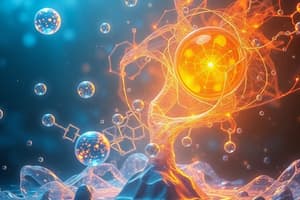Podcast
Questions and Answers
What is the primary factor that determines the solubility of a substance in a polar solvent?
What is the primary factor that determines the solubility of a substance in a polar solvent?
- Temperature of the solvent
- Molecular size and shape of the solute
- Polarity of the solvent and solute (correct)
- Pressure of the solvent
Which type of intermolecular force is responsible for the high boiling point of water?
Which type of intermolecular force is responsible for the high boiling point of water?
- London dispersion forces
- Hydrogen bonding (correct)
- Ion-dipole forces
- Dipole-dipole forces
What is the term for two liquids that can mix in any proportion?
What is the term for two liquids that can mix in any proportion?
- Immiscible
- Soluble
- Miscible (correct)
- Partially miscible
Which of the following is an example of a partially miscible liquid?
Which of the following is an example of a partially miscible liquid?
What is the weakest type of intermolecular force?
What is the weakest type of intermolecular force?
What is the primary factor that affects the viscosity of a liquid?
What is the primary factor that affects the viscosity of a liquid?
Which of the following liquids would have the highest boiling point?
Which of the following liquids would have the highest boiling point?
What is the term for the ability of a substance to dissolve in a solvent to form a homogeneous mixture?
What is the term for the ability of a substance to dissolve in a solvent to form a homogeneous mixture?
Which type of intermolecular force is responsible for the physical properties of methane (CH₄)?
Which type of intermolecular force is responsible for the physical properties of methane (CH₄)?
What is the relationship between the strength of intermolecular forces and the melting point of a substance?
What is the relationship between the strength of intermolecular forces and the melting point of a substance?
Flashcards are hidden until you start studying
Study Notes
Solubility
- Definition: The ability of a substance to dissolve in a solvent to form a homogeneous mixture
- Factors affecting solubility:
- Temperature: Increasing temperature generally increases solubility
- Pressure: Increasing pressure generally increases solubility
- Polarity: Polar solvents dissolve polar solutes, non-polar solvents dissolve non-polar solutes
- Molecular size and shape: Smaller molecules are more soluble than larger ones
- Types of solubility:
- Miscible: Two liquids that can mix in any proportion (e.g., water and ethanol)
- Immiscible: Two liquids that cannot mix (e.g., oil and water)
- Partially miscible: Two liquids that can mix in limited proportions (e.g., phenol and water)
Intermolecular Forces
- Definition: Weak forces between molecules that hold them together in a substance
- Types of intermolecular forces:
- London dispersion forces: Weak forces between non-polar molecules (e.g., methane, CH₄)
- Dipole-dipole forces: Forces between polar molecules with permanent dipoles (e.g., water, H₂O)
- Hydrogen bonding: Strong forces between molecules with hydrogen bonded to a highly electronegative atom (e.g., water, ammonia)
- Ion-dipole forces: Forces between ions and polar molecules (e.g., sodium chloride, NaCl)
- Strength of intermolecular forces:
- London dispersion forces < dipole-dipole forces < hydrogen bonding < ion-dipole forces
- Effects of intermolecular forces:
- Boiling point: Higher boiling point indicates stronger intermolecular forces
- Melting point: Higher melting point indicates stronger intermolecular forces
- Viscosity: Thicker, more viscous liquids have stronger intermolecular forces
Studying That Suits You
Use AI to generate personalized quizzes and flashcards to suit your learning preferences.



